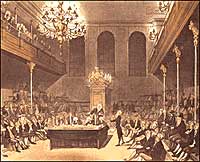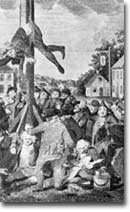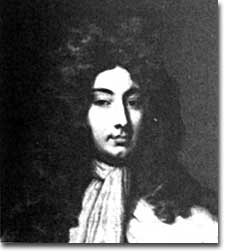9d. The Townshend Acts

"Nervous tension" is the term that best describes the relationship between the American colonies and England in the aftermath of the Stamp Act repeal.
Several issues remained unresolved. First, Parliament had absolutely no wish to send a message across the Atlantic that ultimate authority lay in the colonial legislatures. Immediately after repealing the Stamp Act, Parliament issued the Declaratory Act.
This act proclaimed Parliament's ability "to bind the colonies in all cases whatsoever." The message was clear: under no circumstances did Parliament abandon in principle its right to legislate for the 13 colonies.
In the Western Hemisphere, leaders were optimistic about the repeal of the Stamp Act but found the suggestions of the Declaratory Act threatening. Most American statesmen had drawn a clear line between legislation and taxation. In 1766, the notion of Parliamentary supremacy over the law was questioned only by a radical few, but the ability to tax without representation was another matter. The Declaratory Act made no such distinction. "All cases whatsoever" could surely mean the power to tax. Many assemblymen waited anxiously for the issue to resurface.
|
From infancy I was taught to love humanity and liberty. Inquiry and experience have since confirmed my reverence for the lessons then given me by convincing me more fully of their truth and excellence. Benevolence toward mankind excites wishes for their welfare, and such wishes endear the means of fulfilling them. These can be found in liberty only, and therefore her sacred cause ought to be espoused by every man, on every occasion, to the utmost of his power. As a charitable but poor person does not withhold his mite because he cannot relieve all the distresses of the miserable, so should not any honest man suppress his sentiments concerning freedom, however small their influence is likely to be. Perhaps he may "touch some wheel" that will have an effect greater than he could reasonably expect... – John Dickinson, Letters from a Farmer in Pennsylvania to the Inhabitants of the British Colonies (1767) | ||

As Britain continued to impose taxes on the colonists, reactions turned violent toward tories and British officials.
Sure enough, the "truce" did not last long. Back in London, Charles Townshend persuaded the House of Commons to once again tax the Americans, this time through an import tax on such items as glass, paper, lead, and tea.
The Ties that Bind
Townshend had ulterior motives, however. The revenue from these duties would now be used to pay the salaries of colonial governors. This was not an insignificant change. Traditionally, the legislatures of the colonies held the authority to pay the governors. It was not uncommon for a governor's salary to be withheld if the legislature became dissatisfied with any particular decision. The legislature could, in effect, blackmail the governor into submission. Once this important leverage was removed, the governors could be freer to oppose the assemblies.

Charles Townshend, Chancellor of the Exchequer, sponsored the Townshend Acts. He believed that the Townshend Acts would assert British authority over the colonies as well as increase revenue.
Townshend went further by appointing an American Board of Customs Commissioners. This body would be stationed in the colonies to enforce compliance with tax policy. Customs officials received bonuses for every convicted smuggler, so there were obvious incentives to capture Americans. Given that violators were tried in juryless admiralty courts, there was a high chance of conviction.
Townshend also pressed the Americans to the limit by suspending the New York legislature for failing to provide adequate supplies for the British troops stationed there. Another showdown appeared imminent.
Reactions in the colonies were similar to those during the Stamp Act Crisis. Once again nonimportation was implemented. Extralegal activities such as harassing tax collectors and merchants who violated the boycotts were common. The colonial assemblies sprung into action.
Boston Non-Importation Agreement
August 1, 1768
The merchants and traders in the town of Boston having taken into consideration the deplorable situation of the trade, and the many difficulties it at present labours under on account of the scarcity of money, which is daily increasing for want of the other remittances to discharge our debts in Great Britain, and the large sums collected by the officers of the customs for duties on goods imported; the heavy taxes levied to discharge the debts contracted by the government in the late war; the embarrassments and restrictions laid on trade by several late acts of parliament; together with the bad success of our cod fishery, by which our principal sources of remittance are like to be greatly diminished, and we thereby rendered unable to pay the debts we owe the merchants in Great Britain, and to continue the importation of goods from thence;
We, the subscribers, in order to relieve the trade under those discouragements, to promote industry, frugality, and economy, and to discourage luxury, and every kind of extravagance, do promise and engage to and with each other as follows:
First, That we will not send for or import from Great Britain, either upon our own account, or upon commission, thisfall, any other goods than what are already ordered for the fall supply.
Secondly, That we will not send for or import any kind of goods or merchandize from Great Britain, either on our own account, or on commissions, or any otherwise, from the 1st of January 1769, to the 1st of January 1770, except salt, coals, fish hooks and lines, hemp, and duck bar lead and shot, woolcards and card wire.
Thirdly, That we will not purchase of any factor, or others, any kind of goods imported from Great Britain, from January 1769, to January 1770.
Fourthly, That we will not import, on our own account, or on commissions or purchase of any who shall import from any other colony in America, from January 1769, to January 17 70, any tea, glass, paper, or other goods commonly imported from Great Britain.
Fifthly, That we will not, from and after the 1st of January 1769, import into this province any tea, paper, glass, or painters colours, until the act imposing duties on those articles shall be repealed.
In witness whereof, we have hereunto set our hands, this first day of August, 1768.
– Boston Non-Importation Agreement (August 1, 1768)
Take It Back
In a circular letter to the other colonies, the Massachusetts legislature recommended collective action against the British Parliament. Parliament, in turn, threatened to disband the body unless they repealed the letter. By a vote of 92 to 17, the Massachusetts lawmakers refused and were duly dissolved. Other colonial assemblies voiced support of Massachusetts by affirming the circular letter.
More Information ...
The Massachusetts Cicular Letter was penned by Samuel Adams in 1768. It voiced Massachusetts opposition to taxation without representation and was sent to several colonial legislatures inviting them to unite in their actions against British government. In response, Lord Hillsborough warned colonial legislatures to treat the Circular Letter with contempt and threatened dissolution to any legislative body that adhered to Massachusetts' plea. His words fell on deaf ears as legislative assemblies throughout the colonies, including New York, Rhode Island, and New Jersey, rose to the occasion and accepted the petition set forth by Samuel Adams and Massachusetts.| PERIOD | BRITISH PRIME MINISTER | EVENT |
|---|---|---|
| 1762-63 | John Stuart, Earl of Brute | End of Seven Years War, Treaty of Paris |
| 1763-65 | George Grenville | Issue Sugar Act, Stamp Act, and Currency Act |
| 1765-66 | Charles-Watson Wentworth, Marquess of Rockingham | Repeal Stamp Act, Issue Declaratory Act |
| 1766-68 | William Pitt the Elder, Earl of Chatham | Issue Townshend Acts |
| 1768-70 | Augustus Fitzroy, Duke of Grafton | Unable to implement policy of conciliation towards colonies because of chaos in Parliament |
| 1770-82 | Lord North | Boston Massacre, Repeal Townshend Duties, Issue Tea Act and Intolerable Acts, American Revolution begins with Battles of Lexington and Concord |
| 1782 | Charles-Watson Wentworth, Marquess of Rockingham | Open peace negotiations with America |
| 1782-83 | William Fitzmaurice, Earl of Shelburne | End of American Revolution, Treaty of Paris, 1783 |
The tighter the British grip grew, the more widespread was the resistance. By 1769, British merchants began to feel the sting of nonimportation. In April 1770, news of a partial repeal — the tax on tea was maintained — reached America's shores.
The second compromise came at a high price. It was reached only after a military occupation of Boston and the ensuing Boston Massacre.







